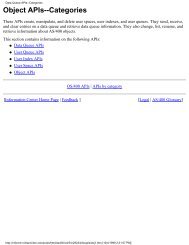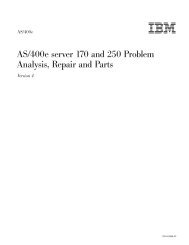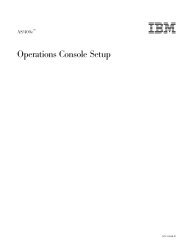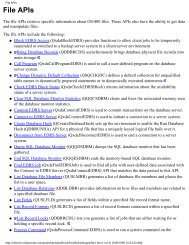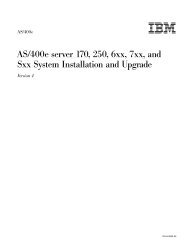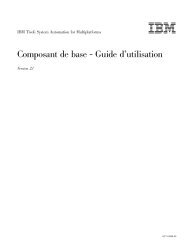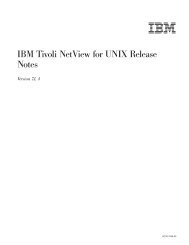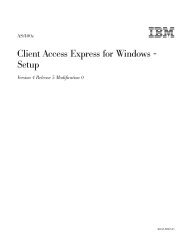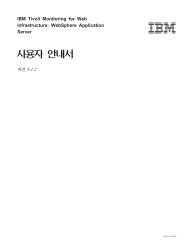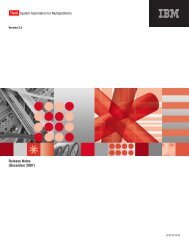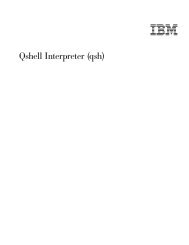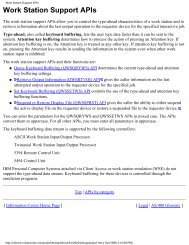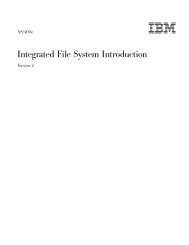You also want an ePaper? Increase the reach of your titles
YUMPU automatically turns print PDFs into web optimized ePapers that Google loves.
104 <strong>File</strong> <strong>Management</strong> V4R5<br />
– INCCHAR(*NONE)<br />
– INCREL(*NONE)<br />
– SRCOPT(*SAME)<br />
– ERRLVL(0)<br />
Restrictions of COMPRESS(*NO) parameter and the CPYF<br />
command<br />
You cannot specify COMPRESS(*NO) for the following types of access paths over<br />
the to-file, including when the access path is contained in a logical file and is based<br />
on the to-file member:<br />
v Unique keys (you specified the UNIQUE keyword in the DDS).<br />
v Select/omit specifications without the DYNSLT keyword (in the DDS for the<br />
file), and immediate or delayed maintenance (MAINT(*IMMED) or<br />
MAINT(*DLY) specified on the CRTPF or CRTLF command).<br />
v Floating-point key field or logical numeric key field (in the DDS for the file), and<br />
immediate or delayed maintenance (MAINT(*IMMED) or MAINT(*DLY)<br />
specified on the CRTPF or CRTLF command). Note that a logical numeric key<br />
field is one of the following:<br />
– A numeric key field in a logical file<br />
– A field specified as a to field on the JFLD keyword that has different<br />
attributes than in the based-on physical file<br />
– A field specified as a sequencing field on the JDUPSEQ keyword that has<br />
different attributes than in the based-on physical file<br />
You cannot specify COMPRESS(*NO) for any of the following cases:<br />
v If you use the JRNPF command to journal the to-file<br />
v If the to-file member is in use or if any access path over the to-file member is in<br />
use<br />
v If you specify an EOFDLY wait time for the from-file on an OVRDBF command.<br />
Details of COMPRESS(*NO) parameter and the CPYF command<br />
COMPRESS(*NO) may allow the system to copy more quickly because records are<br />
transferred in blocks, but this is not always true. Usually, the COMPRESS(*NO)<br />
function does not significantly affect performance. One of the factors you should<br />
consider before you specify COMPRESS(*NO) is that the internal system function<br />
that must be used to perform this type of copy invalidates any keyed access paths<br />
that use the to-file member before the records are copied and then rebuilds the<br />
access paths after the copy is complete. The run time and resource that are<br />
required to rebuild the keyed access paths may be larger than the performance<br />
benefit that is gained by copying deleted records.<br />
If COMPRESS(*NO) is not specified, the system may still use the internal functions<br />
to perform the copy, but the choice of how the copy is performed is based on the<br />
number of records in the from-file and to-file members before the copy, and the<br />
number of keyed access paths over the to-file member.<br />
If MBROPT(*REPLACE) is specified, all keyed access paths over the to-file member<br />
must be invalidated and rebuilt, so specifying COMPRESS(*NO) does not cause<br />
any additional overhead for rebuilding access paths.<br />
If the from-file is a keyed physical file and neither a FROMRCD nor TORCD<br />
relative record number value is specified on the copy commands to force the file to



